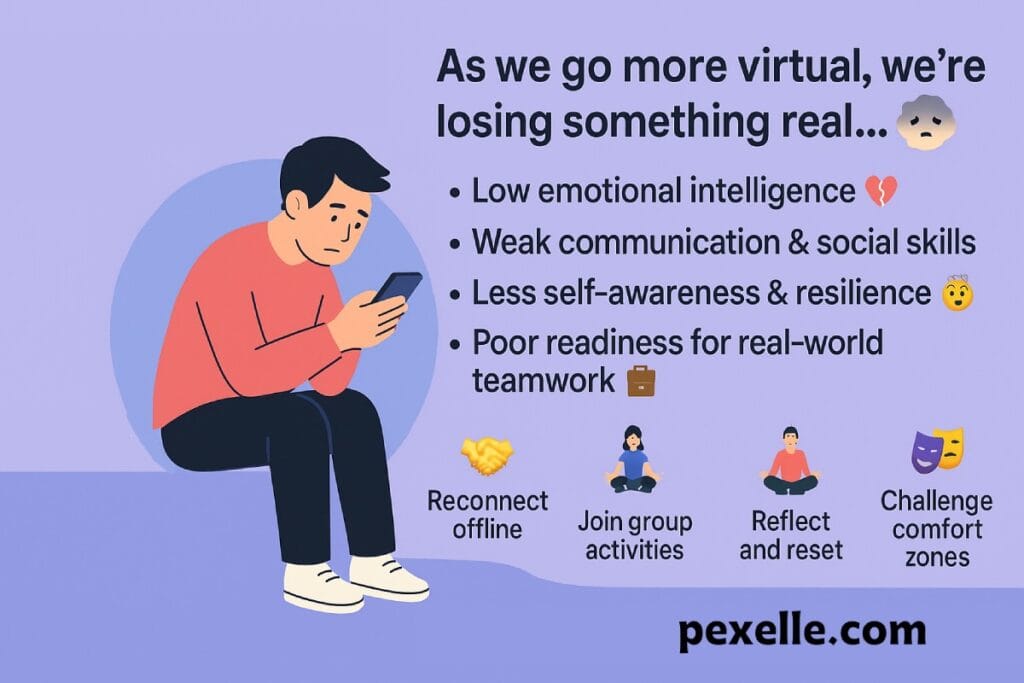The Digital Isolation Dilemma: How Lack of Real Connections Threatens Personal and Societal Skill Development

In an increasingly digital world, the ease of virtual communication has reshaped how we interact, learn, and collaborate. While online platforms offer unprecedented convenience, the gradual erosion of face-to-face interactions has raised critical concerns about the development of personal and interpersonal skills. As society becomes more “connected” online, it paradoxically faces a disconnect that could hinder the growth of essential competencies required for both individual well-being and societal progress.
The Rise of Virtual Life and the Decline of Human Touch
Modern technology allows us to communicate across continents in milliseconds, but this convenience often comes at the cost of depth. Emails, messaging apps, and video calls have replaced long conversations, eye contact, and the subtle cues of body language. Overreliance on screens reduces opportunities to practice empathy, active listening, and conflict resolution — skills that are honed best in physical social settings. For young people in particular, whose emotional intelligence and communication abilities are still developing, this virtual existence can lead to underdeveloped social capacities.
Digital Comfort Zones and Personal Growth Stagnation
The internet creates echo chambers and curated digital spaces where people feel psychologically safe but seldom challenged. Growth, however, is born of discomfort — from debating different ideas, navigating awkward conversations, and overcoming real-life setbacks. In the absence of real-world friction, many avoid situations that would build resilience, self-awareness, or leadership. Skills like public speaking, collaboration, negotiation, and teamwork require physical presence and real feedback — experiences that are hard to replicate in Zoom calls or online forums.
Impacts on Societal Skills and Workforce Readiness
Societies thrive when their members can work together, innovate, and adapt. But the workforce is already seeing the effects of digital detachment. Employers report that even highly educated candidates often lack essential soft skills: communication, emotional regulation, initiative, and adaptability. These deficits are not the result of laziness or lack of intelligence but stem from environments that prioritize technical skills over holistic development. When people are isolated from real community engagement, their capacity to contribute meaningfully to collective goals diminishes.
Mental Health and the Erosion of Self-Understanding
Virtual spaces may provide temporary distraction, but they rarely support deep self-reflection or emotional maturity. Social media promotes comparison over introspection, performance over authenticity. As people become more digitally immersed, many lose the ability to sit with their thoughts, listen without reacting, or set healthy boundaries. This erosion of inner awareness limits not just personal development but the broader emotional fabric of communities, increasing societal fragmentation and mental health issues.
Reclaiming Real-World Engagement: A Path Forward
The answer isn’t to reject technology but to recalibrate our relationship with it. Educational institutions, workplaces, and families must intentionally reintroduce real-world challenges and interpersonal exposure. Encouraging participation in team sports, theater, volunteering, group problem-solving, and community-based learning can restore the balance. Digital detoxes, mindfulness practices, and “offline-first” initiatives are also key tools for rebuilding connection — to self, others, and society.
✅ Final Thought
While technology has revolutionized communication, its overuse has unintended consequences for personal and societal growth. Rebuilding genuine human connections is not just a nostalgic desire — it’s a developmental necessity. If we want emotionally intelligent leaders, collaborative teams, and resilient communities, we must step back from the virtual and re-engage with the real. 🌱
Source : Medium.com




